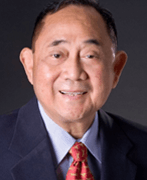We were at the United Nations headquarters in New York last week where we watched with admiration our articulate Philippine Ambassador to the U.N. Teodoro Locsin, Jr. deliver a well-researched speech on Refugees and Human Rights at the U.N. General Assembly.
He spoke of the 10 million Filipinos “working in every corner of the world; many in perilous places; throughout our history we have opened our own doors to waves of refugees, when other countries have turned them away.”
He cited “white Russians fleeing Communism in Russia (at the time); Loyalists fleeing fascism in Spain; We took in Jews fleeing Europe, Vietnamese boat people, and Nationalist Chinese, offering them citizenship. We offered unconditional asylum to Rohingyas in Myanmar, not once but twice, most recently by President Duterte, who said he ‘would not mind refugees, filling the country to the brim’.”
We told Ambassador Locsin we were reminded of our own address at the U.N. Security Council in 2004, when we proposed the establishment of an Inter-Faith Council at the U.N. to replace the U.N. Trusteeship Council, since we agreed almost all the Trust Territories in the world have already became independent. But this could not be done without amending the Charter of the U.N., a most difficult exercise. We succeeded partially in any case. As a compromise, the U.N. created an Interfaith Unit in the Office of the U.N. Secretary General to take care of inter-religious initiatives and issues.
Since then, Interfaith discussions, previously taboo in the U.N. system, are today regularly held at the U.N. and in the associated interfaith conferences in various parts of the world.
We noted that these initiatives should help to reconcile the politico-religious, ethnic and communal conflicts that have raged over the centuries and again exploded in our midst in the first years of the 21st Century in Lebanon, Palestine, Chechnya in Russia, Mindanao, Southern Thailand, Aceh in Indonesia, Sri Lanka, Nepal, Kashmir, Northern Ireland, Sudan, Nigeria, Iraq and Afghanistan.
We wrote about these problem areas extensively in 2007 in our presentation at the ASEAN Leaders Summit in Cebu City on January 13, 2007 when we were Speaker of the House and Chairman of the ASEAN Inter-Parliamentary Assembly (AIPA). Of course since then progress had already been made in Aceh, Chechnya, Sri Lanka, Nepal, and in the Catholic-Protestant conflict in Northern Ireland.
In the Philippines, the local inter-faith counterpart was the Bishops Ulama Conferences in Mindanao, where Catholic and Protestant Bishops held occasional consultations-meetings with the Muslim Ulama leaders, and who were quite helpful when we assisted negotiations for the successful MNLF (Moro National Liberation Front) talks wich which led to a formal peace agreement in 1996 and in the many early rounds of the MILF (Moro Islamic Liberation Front) peace negotiations which followed afterwards.
Truly, we believe more than ever these Bishops-Ulama meetings in Mindanao should be reactivated today and held from time to time to assist Government in dealing with the politico-religious conflict, insurgency, and violent extremism issues in Mindanao, which led to the bloody Marawi uprising, and which, thank God, President Duterte and the Armed Forces have finally subdued at great cost. Complex problems in other parts of Mindanao remain, thus the rationale for Congress’ extension of the declaration of Martial Law for Mindanao until Dec. 31, 2018.
As part of the world community’s efforts to support moderate groups and isolate religious extremists, the U.N., individual governments and religious-civil societies began to promote interfaith dialogues, as mandated by a U.N. General Assembly resolution which we in the Philippines initiated in 2005.
We believe that multi-religious understanding could be the only basis for the long-term security of the global community, and the only basis for global peace that will endure.
For there is some truth in what we said then and we say it again: there can be “no peace among nations unless there is peace among the religions.”
In our next column, we will try to revive our old proposals in letters we sent then to the King of Saudi Arabia and Iran’s two highest officials, the Supreme Religious Leader and the President of Iran on the need to revive the centuries-old historic Sunni-Shiite talks, a most difficult undertaking, but the indispensable key to the solution of genuine peace in the Arab world, the Middle East, and parts of Asia and Africa.






